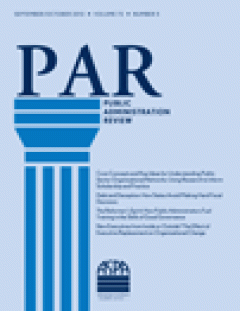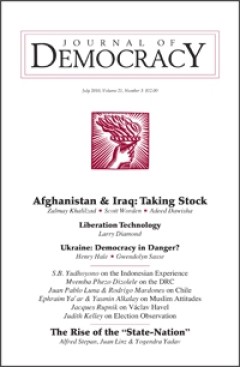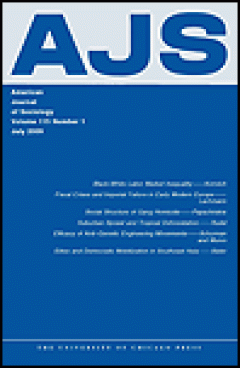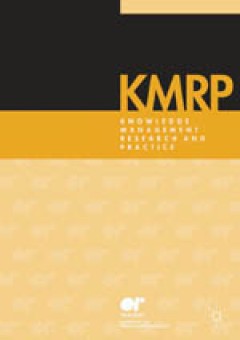Filter by

Taking Nonprofit Intermediaries Seriously : A Middle-Range Theory for Impleme…
The federal government often works through nonprofit intermediaries to reach and empower communities in the United States. One increasingly popular policy strategy is to offer grant funding to intermediary organizations in an effort to strengthen communities. Funded intermediaries are tasked with building the capacity of faith-based and community organizations at the local level, but the policy…
- Edition
- Volume 71, Issue 1, pages 57–66, Jan/Feb 2011
- ISBN/ISSN
- 00333352
- Collation
- -
- Series Title
- Public Administration Review
- Call Number
- -

Soldiers to Citizens : The Link between Military Service and Volunteering
Research shows that military service is linked with political engagement, such as voting. This connection is strongest for minorities. The authors explore the relationship between military service and volunteering. They conclude that military service helps overcome barriers to volunteering by socializing people with civic responsibility norms, by providing social resources and skills that compe…
- Edition
- Volume 71, Issue 1, pages 67–76, Jan/Feb 2011
- ISBN/ISSN
- 00333352
- Collation
- -
- Series Title
- Public Administration Review
- Call Number
- -

Predictors of Administrative and Technological Innovations in Nonprofit Organ…
This study examines the effects of human and structural/process factors on two types of innovation�administrative and technological�in a sample of nonprofit organizations. The results indicate that factors that are favorable to administrative innovations differ from those that are conducive to technological innovation. Three variables are significant predictors of administrative innovation: cen…
- Edition
- Volume 71, Issue 1, pages 77–86, Jan/Feb 2011
- ISBN/ISSN
- 00333352
- Collation
- -
- Series Title
- Public Administration Review
- Call Number
- -

Deconstructing School Choice : Problem Schools or Problem Students?
School choice has developed into one of the most contentious policy debates in K�12 education. Proponents argue that choice leads to competition among schools, thereby raising school quality for all students, while opponents claim that school choice often results in racial segregation and worsens inequity. The findings of this study, collected from qualitative interviews with school administrat…
- Edition
- Volume 71, Issue 1, pages 87–95, Jan/Feb 2011
- ISBN/ISSN
- 00333352
- Collation
- -
- Series Title
- Public Administration Review
- Call Number
- -

Public Administration as an Interdisciplinary Field : Assessing Its Relations…
Public administration is an interdisciplinary field, building on a variety of disciplinary approaches and values. But how well does the field of public administration reflect those values and processes? In contrast to previous arguments regarding the degree to which the field does or should incorporate values and lessons from other academic disciplines, this study provides a systematic assessme…
- Edition
- Volume 71, Issue 1, pages 96–101, Jan/Feb 2011
- ISBN/ISSN
- 00333352
- Collation
- -
- Series Title
- Public Administration Review
- Call Number
- -

Gendering Agricultural Aid : An Analysis of Whether International Development…
Gender-based inequalities constrain women�s ability to participate in efforts to enhance agricultural production and reduce poverty and food insecurity. To resolve this, development organizations have targeted women and more recently �mainstreamed� gender within their agricultural aid programs. Through an analysis of agricultural-related development aid, we examine whether funded agricultural p…
- Edition
- Vol. 25 no. 1, February 2011.pp. 48-74
- ISBN/ISSN
- 08912432
- Collation
- -
- Series Title
- Gender & Society
- Call Number
- -

Why Democracies Survive
As an analysis of recent electoral results shows, the world�s emerging democracies are weathering the global economic crisis surprisingly well. Yet they remain under an even sharper threat from their own failures to deliver good governance.
- Edition
- Volume 22, Number 1, January 2011, .pp. 17-30
- ISBN/ISSN
- 10455736
- Collation
- -
- Series Title
- Journal of Democracy
- Call Number
- -

From the G-8 to the G-20
The financial crisis did not deal a fatal blow to any democracies, but it did hasten an erosion of the influence of the West. In the future, the balance of power among competing regime types may be decided by the emerging-market democracies.
- Edition
- Volume 22, Number 1, January 2011. pp.31-38
- ISBN/ISSN
- 10455736
- Collation
- -
- Series Title
- Journal of Democracy
- Call Number
- -

Latin America’s Growing Security Gap
Striking the right balance between freedom and security is hard, especially in Latin America. Hybrid forces combining military and police elements may be the best means for meeting security challenges without imperiling freedom.
- Edition
- Volume 22, Number 1, January 2011.pp.39-53
- ISBN/ISSN
- 10455736
- Collation
- -
- Series Title
- -
- Call Number
- -

Hong Kong’s Democrats Divide
For the first time ever in the history of Hong Kong, local democratic leaders and Chinese officials have forged a pact on limited democratic reforms. That may have marked a step forward for the cause of democracy in Hong Kong, but it has also led to a sharp split in the democratic camp.
- Edition
- Volume 22, Number 1, January 2011.pp. 54-67
- ISBN/ISSN
- 10455736
- Collation
- -
- Series Title
- -
- Call Number
- -

Arab Islamists : Losing on Purpose?
In most Arab countries, Islamist groups are the only ones with the popular support needed to win free and fair elections. Yet Islamist parties have shown an ambivalence about and in some cases even an aversion to seeking power via the ballot box.
- Edition
- Volume 22, Number 1, January 2011.pp. 68-80
- ISBN/ISSN
- 10455736
- Collation
- -
- Series Title
- Journal of Democracy
- Call Number
- -

Building Democracy While Building Peace
Why are peacebuilding operations rarely able to establish postconflict democracies, and are there other strategies that would yield more successes?
- Edition
- Volume 22, Number 1,January 2011, pp. 81-95
- ISBN/ISSN
- 10455736
- Collation
- -
- Series Title
- Journal of Democracy
- Call Number
- -

Constraining Government Power in Africa
African politics is often characterized as a realm of �informality,� but formal rules and institutions actually loom large, especially with regard to overweening executive power and the reforms that may help to rein it in.
- Edition
- Volume 22, Number 1, January 2011,pp. 96-106
- ISBN/ISSN
- 10455736
- Collation
- -
- Series Title
- -
- Call Number
- -

A Surge to the Center
The left-right ideological divide has begun to narrow in Latin America as citizens and leaders increasingly choose a pragmatic approach to politics and embrace the rules of the democratic game.
- Edition
- Volume 22, Number 1, January 2011.pp. 107-121
- ISBN/ISSN
- 10455736
- Collation
- -
- Series Title
- Journal of Democracy
- Call Number
- -

A Setback for Chávez
Hugo Ch�vez has been running a bounded competitive-authoritarian regime for some time, but its ability to compete is now slipping. Will this tend to make it less authoritarian�or even more so?
- Edition
- Volume 22, Number 1, January 2011.pp. 122-136
- ISBN/ISSN
- 10455736
- Collation
- -
- Series Title
- Journal of Democracy
- Call Number
- -

Colombia After Uribe
Often thought of as a �nascent� democracy, Colombia actually has longstanding democratic institutions. In 2010, they were effective in determining who would succeed a highly popular, two-term president.
- Edition
- Volume 22, Number 1, January 2011.pp. 137-151
- ISBN/ISSN
- 10455736
- Collation
- -
- Series Title
- Journal of Democracy
- Call Number
- -

The Locus of Racial Disadvantage in the Labor Market
Using a pooled sample constructed from recent installments of the Displaced Workers Survey, this study examines the racial disparities in postdisplacement outcomes while controlling for the predisplacement experience and earnings of individual workers. It finds no racial difference in the reemployment wage, but there is a large racial disparity in the chances of reemployment among workers with …
- Edition
- Vol. 116, No. 3, November 2010. pp. 909-942
- ISBN/ISSN
- 00029602
- Collation
- -
- Series Title
- American Journal of Sociology
- Call Number
- -

A Model of Robust Positions in Social Networks
This article introduces a network model that pictures occupants of robust positions as recipients of diversified support from durably located others and portrays occupants of fragile positions as dependents on tenuously situated others. The model extends Herfindahl's index of concentration by bringing in the recursiveness of Bonacich's method. Using Newcomb's study of a college fraternity, we f…
- Edition
- Vol. 116, No. 3, November 2010. pp. 943-992
- ISBN/ISSN
- 00029602
- Collation
- -
- Series Title
- American Journal of Sociology
- Call Number
- -

International academic knowledge creation and ba. A case study from Finland
Knowledge is created through discourse in ba that is the physical, mental and/or virtual arena of knowledge creation. This article studies ba in international humanist (H-group), technical (T-group) and scientific (S-group) research groups. These international groups consist of members originating from many countries. The empirical evidence is derived from interviews and discourse analysis of t…
- Edition
- Vol. 9, No. 1, March 2011.pp. 4–16
- ISBN/ISSN
- 14778238
- Collation
- -
- Series Title
- Knowledge Management Research & Practice
- Call Number
- -

A study of knowledge management enablers across countries
Knowledge has been long cited as a strategic asset and a source of competitive advantage for organizations. However, the creation of knowledge is a complex process that is influenced by several factors beyond the typical practice of knowledge management (KM). In this research, we assess the effects of leadership, Ba (shared context in motion), organizational culture, organizational control, and…
- Edition
- Vol. 9, No. 1, March 2011.pp.17–28
- ISBN/ISSN
- 14778238
- Collation
- -
- Series Title
- Knowledge Management Research & Practice
- Call Number
- -
 Computer Science, Information & General Works
Computer Science, Information & General Works  Philosophy & Psychology
Philosophy & Psychology  Religion
Religion  Social Sciences
Social Sciences  Language
Language  Pure Science
Pure Science  Applied Sciences
Applied Sciences  Art & Recreation
Art & Recreation  Literature
Literature  History & Geography
History & Geography